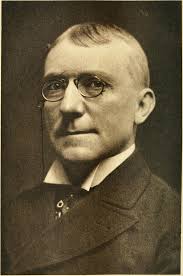Armazindy Page #2
James Whitcomb Riley poems book published in the 1894 book Armazindy and received very negative reviews that referred to poems like "The Little Dog-Woggy" and "Jargon-Jingle" as "drivel" and to Riley as a "worn out genius". Most of his growing number of critics suggested that he ignored the quality of the poems for the sake of making money.
Fer to let her have her own Way about it.—But a-goin’ Past to town, they’d stop and see “Armazindy’s fambily,” As they’d allus laugh and say, And look sorry right away, Thinkin’ of her Pap, and how He’d indorse his “Soldier” now! ’Course she couldn’t never be Much in young-folks’ company— Plenty of in-vites to go, But das’t leave the house, you know— ’Less’n Sund’ys sometimes, when Some old Granny’d come and ’ten’ Things, while Armazindy has Got away fer Church er “Class.” Most the youngsters liked her—and ’Twuzn’t hard to understand,— Fer, by time she wuz sixteen, Purtier girl you never seen— ’Ceptin’ she lacked schoolin’, ner Couldn’t rag out stylisher— Like some neighber-girls, ner thumb On their blame’ melodium, Whilse their pore old mothers sloshed Round the old back-porch and washed Their clothes fer ’em—rubbed and scrubbed Fer girls’d ort to jes be’n clubbed! —And jes sich a girl wuz Jule Reddinhouse.—She’d be’n to school At New Thessaly, i gum!— Fool before, but that he’pped some— ’Stablished-like more confidence ’At she never had no sense. But she wuz a cunnin’, sly, Meek and lowly sort o’ lie, ’At men-folks like me and you B’lieves jes ’cause we ortn’t to.— Jes as purty as a snake, And as pizen—mercy sake! Well, about them times it wuz, Young Sol Stephens th’ashed fer us; And we sent him over to Armazindy’s place to do Her work fer her.—And-sir! Well— Mighty little else to tell,— Sol he fell in love with her— Armazindy Ballenger! Bless ye!—’Ll, of all the love ’At I’ve ever yit knowed of, That-air case o’ theirn beat all! W’y, she worshipped him!—And Sol, ’Peared-like, could ’a’ kissed the sod (Sayin’ is) where that girl trod! Went to town, she did, and bought Lot o’ things ’at neighbers thought Mighty strange fer her to buy,— Raal chintz dress-goods—and ’way high!— Cut long in the skyrt,—also Gaiter-pair o’ shoes, you know; And lace collar;—yes, and fine Stylish hat, with ivy-vine And red ribbons, and these-’ere Artificial flowers and queer Little beads and spangles, and Oysturch-feathers round the band! Wore ’em, Sund’ys, fer a while— Kindo’ went to Church in style, Sol and Armazindy!—Tel It was noised round purty well They wuz promised.—And they wuz— Sich news travels—well it does!— Pity ’at that did!—Fer jes That-air fac’ and nothin’ less Must ’a’ putt it in the mind O’ Jule Reddinhouse to find Out some dratted way to hatch Out some plan to break the match— ’Cause she done it!—How? they’s none Knows adzac’ly what she done; Some claims she writ letters to Sol’s folks, up nigh Pleasant View Somers—and described, you see, “Armazindy’s fambily”— Hintin’ “ef Sol married her, He’d jes be pervidin’ fer Them-air twins o’ hern, and old Palsied aunt ’at couldn’t hold Spoon to mouth, and layin’ near Bedrid’ on to eighteen year’, And still likely, ’pearantly, To live out the century!” Well—whatever plan Jule laid Out to reach the p’int she made, It wuz desper’t.—And she won, Finully, by marryun Sol herse’f—e-lopin’, too, With him, like she had to do,— ’Cause her folks ’ud allus swore “Jule should never marry pore!” This-here part the story I Allus haf to hurry by,— Way ’at Armazindy jes Drapped back in her linsey dress, And grabbed holt her loom, and shet Her jaws square.—And ef she fret Any ’bout it—never ’peared Sign ’at neighbers seed er heerd;— Most folks liked her all the more— I know I did—certain-shore!— (’Course I’d knowed her Pap, and what Stock she come of.—Yes, and thought, And think yit, no man on earth ’S worth as much as that girl’s worth!) As fer Jule and Sol, they had Their sheer!—less o’ good than bad!— Her folks let her go.—They said, “Spite o’ them she’d made her bed And must sleep in it!”—But she, ’Peared-like, didn’t sleep so free As she ust to—ner so late, Ner so fine, I’m here to state!— Sol wuz pore, of course, and she Wuzn’t ust to poverty— Ner she didn’t ’pear to jes ’Filiate with lonesomeness,— ’Cause Sol he wuz off and out With his th’asher nigh about Half the time; er, season done, He’d be off mi-anderun Round the country, here and there, Swoppin’ hosses. Well, that-air Kind o’ livin’ didn’t suit Jule a bit!—and then, to boot, She had now the keer o’ two Her own childern—and to do Her own work and cookin’—yes, And sometimes fer hands, I guess, Well as fambily of her own.— Cut her pride clean to the bone! So how could the whole thing end?— She set down, one night, and penned A short note, like—’at she sewed On the childern’s blanket—blowed Out the candle—pulled the door To close after her—and, shore- Footed as a cat is, clumb In a rigg there and left home, With a man a-drivin’ who “Loved her ever fond and true,” As her note went on to say, When Sol read the thing next day. Raally didn’t ’pear to be Extry waste o’ sympathy Over Sol—pore feller!—Yit, Sake o’ them-air little bit O’ two orphants—as you might Call ’em then, by law and right,— Sol’s old friends wuz sorry, and Tried to hold him out their hand Same as allus: But he’d flinch— Tel, jes ’peared-like, inch by inch, He let all holts go; and so Took to drinkin’, don’t you know,— Tel, to make a long tale short, He wuz fuller than he ort To ’a’ be’n, at work one day ’Bout his th’asher, and give way, Kindo’-like, and fell and ketched In the beltin’. ... Rid and fetched Armazindy to him.—He Begged me to.—But time ’at she Reached his side, he smiled and tried To speak.—Couldn’t. So he died.... Hands all turned and left her there And went somers else—somewhere. Last, she called us back—in clear Voice as man’ll ever hear— Clear and stiddy, ’peared to me, As her old Pap’s ust to be.— Give us orders what to do ’Bout the body—he’pped us, too. So it wuz, Sol Stephens passed In Armazindy’s hands at last. More’n that, she claimed ’at she Had consent from him to be Mother to his childern—now ’Thout no parents anyhow. Yes-sir! and she’s got ’em, too,— Folks saw nothin’ else ’ud do— So they let her have her way— Like she’s doin’ yit to-day! Years now, I’ve be’n coaxin’ her— Armazindy Ballenger— To in-large her fambily Jes one more by takin’ me— Which I’m feared she never will, Though I’m ’lectioneerin’ still. THE OLD TRUNDLE-BED O the old trundle-bed where I slept when a boy! What canopied king might not covet the joy? The glory and peace of that slumber of mine, Like a long, gracious rest in the bosom divine: The quaint, homely couch, hidden close from the light, But daintily drawn from its hiding at night. O a nest of delight, from the foot to the head, Was the queer little, dear little, old trundle-bed!
Translation
Translate and read this book in other languages:
Select another language:
- - Select -
- 简体中文 (Chinese - Simplified)
- 繁體中文 (Chinese - Traditional)
- Español (Spanish)
- Esperanto (Esperanto)
- 日本語 (Japanese)
- Português (Portuguese)
- Deutsch (German)
- العربية (Arabic)
- Français (French)
- Русский (Russian)
- ಕನ್ನಡ (Kannada)
- 한국어 (Korean)
- עברית (Hebrew)
- Gaeilge (Irish)
- Українська (Ukrainian)
- اردو (Urdu)
- Magyar (Hungarian)
- मानक हिन्दी (Hindi)
- Indonesia (Indonesian)
- Italiano (Italian)
- தமிழ் (Tamil)
- Türkçe (Turkish)
- తెలుగు (Telugu)
- ภาษาไทย (Thai)
- Tiếng Việt (Vietnamese)
- Čeština (Czech)
- Polski (Polish)
- Bahasa Indonesia (Indonesian)
- Românește (Romanian)
- Nederlands (Dutch)
- Ελληνικά (Greek)
- Latinum (Latin)
- Svenska (Swedish)
- Dansk (Danish)
- Suomi (Finnish)
- فارسی (Persian)
- ייִדיש (Yiddish)
- հայերեն (Armenian)
- Norsk (Norwegian)
- English (English)
Citation
Use the citation below to add this book to your bibliography:
Style:MLAChicagoAPA
"Armazindy Books." Literature.com. STANDS4 LLC, 2024. Web. 22 Oct. 2024. <https://www.literature.com/book/armazindy_946>.




Discuss this Armazindy book with the community:
Report Comment
We're doing our best to make sure our content is useful, accurate and safe.
If by any chance you spot an inappropriate comment while navigating through our website please use this form to let us know, and we'll take care of it shortly.
Attachment
You need to be logged in to favorite.
Log In